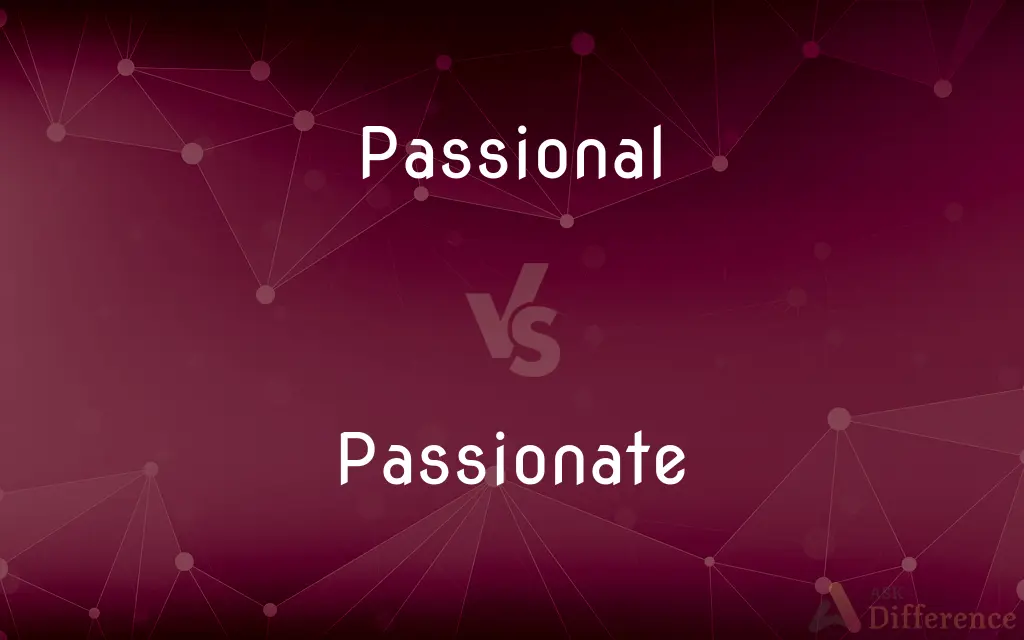Passional vs. Passionate — What's the Difference?
By Urooj Arif & Fiza Rafique — Updated on April 17, 2024
Passional refers to something related to passions or emotions, typically used in formal contexts, whereas passionate describes someone intensely emotional or enthusiastic, common in everyday language.

Difference Between Passional and Passionate
Table of Contents
ADVERTISEMENT
Key Differences
Passional is an adjective mainly used in formal or literary contexts to describe things related to the passions, as in emotions or strong feelings. Whereas, passionate is commonly used to describe a person who exhibits a powerful, intense enthusiasm or desire for something. This distinction highlights how each term fits into different registers of speech.
Passional might be employed to characterize a subject or theme within art or literature that deals with deep emotional subjects. On the other hand, passionate is often used to describe individuals or their actions, such as a passionate speaker or a passionate response, indicating a high level of emotional investment and energy.
In religious or philosophical discussions, passional can be specifically related to the passions as a driving force of human behavior. Whereas, passionate in such discussions would typically refer to someone having a fervent belief or a spirited dedication to a cause or ideology.
The usage frequency of passional is considerably lower than that of passionate, which is widely recognized and used across various contexts from casual conversations to professional descriptions. This difference in usage also affects how familiar or accessible each term might feel to a general audience.
Despite their related roots in discussing emotions or enthusiasm, passional tends to have a more niche appeal, suited for specific or scholarly discussions. In contrast, passionate is versatile, fitting easily into everyday language and a broad array of contexts, making it far more prevalent in spoken and written English.
ADVERTISEMENT
Comparison Chart
Usage Context
Formal, literary
Broad, everyday
Common Associations
Art, literature, philosophy
Emotions, enthusiasm, personal commitment
Frequency of Use
Less common
Highly common
Connotation
Often neutral, analytical
Generally positive, intense
Typical Subjects
Themes, concepts
People, actions
Compare with Definitions
Passional
Of or pertaining to suffering or martyrdom.
The saint's passional legacy was revered in the church.
Passionate
Characterized by intense emotion or fervor.
The debate turned passionate as opinions clashed.
Passional
Pertaining to the passions or emotions.
The narrative was described as passional due to its emotional depth.
Passionate
Capable of, affected by, or expressing intense feeling.
His passionate speech inspired the crowd.
Passional
Relating to the passions as a philosophical concept.
The treatise explored passional elements in human nature.
Passionate
Involving a strong liking or desire.
She has a passionate interest in history.
Passional
Literary term referring to passionate elements in art.
His passional interpretation of the poem was applauded.
Passionate
Enthusiastic or eager about something.
He is passionate about playing the guitar.
Passional
Influenced by or showing strong emotion.
Her passional plea moved the audience.
Passionate
Showing or caused by strong feelings or a strong belief.
She is passionate about environmental issues.
Passional
Of, relating to, or filled with passion.
Passionate
Having, showing, or caused by strong feelings or beliefs
He's passionate about football
Passionate pleas for help
Passional
Grounded in or relating to emotion rather than intellect.
Passionate
Capable of, having, or dominated by powerful emotions
A family of passionate personalities.
Passional
A book describing sufferings of martyrs
Passionate
Wrathful by temperament; choleric.
Passional
Characterized by passion
Passionate
Showing or expressing strong emotion; ardent
A passionate speech against injustice.
Passional
Of or pertaining to passion or the passions; exciting, influenced by, or ministering to, the passions.
Passionate
Arising from or marked by passion
A teacher who is passionate about her subject.
Passionate
Fired with intense feeling.
Passionate
(obsolete) Suffering; sorrowful.
Passionate
A passionate individual.
Passionate
(obsolete) To fill with passion, or with another given emotion.
Passionate
(obsolete) To express with great emotion.
Passionate
Capable or susceptible of passion, or of different passions; easily moved, excited or agitated; specifically, easily moved to anger; irascible; quick-tempered; as, a passionate nature.
Homer's Achilles is haughty and passionate.
Passionate
Characterized by passion; expressing passion; ardent in feeling or desire; vehement; warm; as, a passionate friendship.
Passionate
Suffering; sorrowful.
Passionate
To affect with passion; to impassion.
Great pleasure, mixed with pitiful regard,The godly king and queen did passionate.
Passionate
To express feelingly or sorrowfully.
Passionate
Having or expressing strong emotions
Common Curiosities
What is the primary difference between passional and passionate?
Passional is mostly used in formal contexts related to emotions, while passionate is broadly used to describe intense feelings or enthusiasm in various contexts.
Is passional a common term in everyday language?
No, passional is relatively uncommon and mostly used in scholarly or literary texts.
What is an example of a passionate action?
Delivering a fervent speech or defending a cause with strong enthusiasm are examples of passionate actions.
Why might someone prefer to use passional in writing?
Writers might choose passional to add a formal or scholarly tone, especially when discussing themes related to human emotions or philosophical concepts.
Are there specific genres where passional might be more appropriate?
Yes, in philosophical discussions or literary analysis, passional might be more appropriate due to its formal tone.
What types of subjects can be described as passional?
Themes or concepts in art and philosophy can be described as passional.
How does passionate enhance the description of a person?
Using passionate suggests a high level of emotional investment and energy, emphasizing their enthusiasm or dedication.
Can passional and passionate be used interchangeably?
They are not generally interchangeable due to different usage contexts; passional is more formal and specific, whereas passionate is versatile and common.
How does passional relate to historical or religious texts?
Passional can be used to describe narratives or figures in historical and religious contexts, often relating to martyrdom or profound emotional experiences.
Can someone be described as passional?
It's less common, but in a formal or literary context, it might be used to describe someone's characteristics relating to deep emotional or philosophical commitments.
Is it common to find passional in modern texts?
Passional is rare in modern everyday texts but might appear in academic, religious, or literary analyses.
What impact does passionate have in professional settings?
In professional contexts, being described as passionate can reflect positively, indicating dedication and strong commitment to one's work.
What makes passionate a preferred adjective in everyday speech?
Its versatility and positive connotation make passionate suitable for expressing strong emotions or enthusiasm in everyday interactions.
Can passionate be viewed negatively?
While usually positive, in some contexts, being too passionate might be viewed as overwhelming or excessively emotional.
Share Your Discovery

Previous Comparison
Lodge vs. Resort
Next Comparison
Rapper vs. TrapperAuthor Spotlight
Written by
Urooj ArifUrooj is a skilled content writer at Ask Difference, known for her exceptional ability to simplify complex topics into engaging and informative content. With a passion for research and a flair for clear, concise writing, she consistently delivers articles that resonate with our diverse audience.
Co-written by
Fiza RafiqueFiza Rafique is a skilled content writer at AskDifference.com, where she meticulously refines and enhances written pieces. Drawing from her vast editorial expertise, Fiza ensures clarity, accuracy, and precision in every article. Passionate about language, she continually seeks to elevate the quality of content for readers worldwide.














































